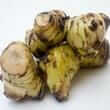Background
- Alpinia is a large genus from the ginger family (Zingiberaceae). Alpinia has been known in Europe for several centuries longer than its botanical origin. It was recognized in 1870, when specimens were examined that had been found near Tung-sai, in the extreme south of China, and later, on the island of Hainan.
- Traditional uses have included treatment of flatulence (gas), dyspepsia (stomach upset), vomiting, high blood pressure, gastrointestinal complaints, and sea sickness.
- Alpinia has been studied for its diuretic (increasing urine flow) effects. Although alpinia is generally believed to be well-tolerated, safety is not well studied. Currently, there is not enough available scientific evidence for or against the use of alpinia for any indication.
References
Natural Standard developed the above evidence-based information based on a thorough systematic review of the available scientific articles. For comprehensive information about alternative and complementary therapies on the professional level, go to . Selected references are listed below.
- Altman RD, Marcussen KC. Effects of a ginger extract on knee pain in patients with osteoarthritis. Arthritis Rheum 2001;44(11):2531-2538.
View Abstract - Ando S, Matsuda H, Morikawa T, et al. 1'S-1'-Acetoxychavicol acetate as a new type inhibitor of interferon-beta production in lipopolysaccharide-activated mouse peritoneal macrophages. Bioorg Med Chem 2005;13(9):3289-3294.
View Abstract - Arambewela LS, Arawwawala LD, Ratnasooriya WD. Antinociceptive activities of aqueous and ethanolic extracts of Alpinia calcarata rhizomes in rats. J Ethnopharmacol 2004;95(2-3):311-316.
View Abstract - Bendjeddou D, Lalaoui K, Satta D. Immunostimulating activity of the hot water-soluble polysaccharide extracts of Anacyclus pyrethrum, Alpinia galanga and Citrullus colocynthis. J Ethnopharmacol 2003;88(2-3):155-160.
View Abstract - de Araujo PF, Coelho-de-Souza AN, Morais SM, et al. Antinociceptive effects of the essential oil of Alpinia zerumbet on mice. Phytomedicine 2005;12(6-7):482-486.
View Abstract - de Moura RS, Emiliano AF, de Carvalho LC, et al. Antihypertensive and endothelium-dependent vasodilator effects of Alpinia zerumbet, a medicinal plant. J Cardiovasc Pharmacol 2005;46(3):288-294.
View Abstract - Grzanna R, Phan P, Polotsky A, et al. Ginger extract inhibits beta-amyloid peptide-induced cytokine and chemokine expression in cultured THP-1 monocytes. J Altern Complement Med 2004;10(6):1009-1013.
View Abstract - Jantan I, Pisar M, Sirat HM, et al. Inhibitory effects of compounds from Zingiberaceae species on platelet activating factor receptor binding. Phytother Res 2004;18(12):1005-1007.
View Abstract - Jantan I, Rafi IA, Jalil J. Platelet-activating factor (PAF) receptor-binding antagonist activity of Malaysian medicinal plants. Phytomedicine 2005;12(1-2):88-92.
View Abstract - Koo BS, Lee WC, Chang YC, et al. Protective effects of alpinae oxyphyllae fructus (Alpinia oxyphylla MIQ) water-extracts on neurons from ischemic damage and neuronal cell toxicity. Phytother Res 2004;18(2):142-148.
View Abstract - Leal-Cardoso JH, Moreira MR, da Cruz GM, et al. Effects of essential oil of Alpinia zerumbet on the compound action potential of the rat sciatic nerve. Phytomedicine 2004;11(6):549-553.
View Abstract - Matsuda H, Morikawa T, Managi H, et al. Antiallergic principles from Alpinia galanga: structural requirements of phenylpropanoids for inhibition of degranulation and release of TNF-alpha and IL-4 in RBL-2H3 cells. Bioorg Med Chem Lett 2003;13(19):3197-3202.
View Abstract - Sawangjaroen N, Subhadhirasakul S, Phongpaichit S, et al. The in vitro anti-giardial activity of extracts from plants that are used for self-medication by AIDS patients in southern Thailand. Parasitol Res 2005;95(1):17-21.
View Abstract - Wang YC, Huang TL. Screening of anti-Helicobacter pylori herbs deriving from Taiwanese folk medicinal plants. FEMS Immunol Med Microbiol 2005;43(2):295-300.
View Abstract - Yu X, An L, Wang Y, et al. Neuroprotective effect of Alpinia oxyphylla Miq. fruits against glutamate-induced apoptosis in cortical neurons. Toxicol Lett 2003;144(2):205-212.
View Abstract







